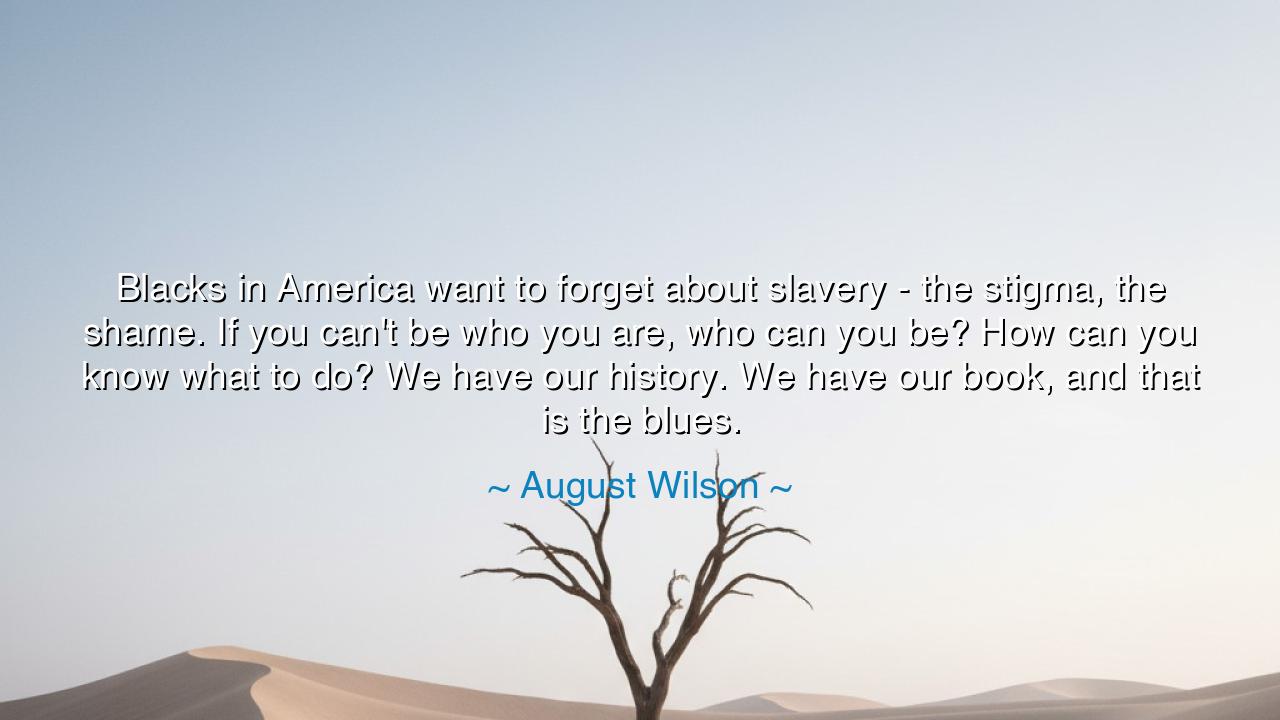
Blacks in America want to forget about slavery - the stigma, the
Blacks in America want to forget about slavery - the stigma, the shame. If you can't be who you are, who can you be? How can you know what to do? We have our history. We have our book, and that is the blues.






In the words of August Wilson, the great dramatist of the American soul, there resounds a truth as deep as the roots of sorrow and as luminous as the light that follows it: “Blacks in America want to forget about slavery — the stigma, the shame. If you can’t be who you are, who can you be? How can you know what to do? We have our history. We have our book, and that is the blues.” These are not the words of mere remembrance; they are a song — a lament and a declaration — for a people who have carried both chains and fire, both grief and genius. Wilson speaks not of nostalgia, but of identity — of the sacred need to remember. For to deny the past is to cut the roots that feed the soul.
The origin of Wilson’s thought lies in the long shadow of history — the centuries of slavery that shaped not only the lives of African Americans but the very fabric of the nation itself. In his plays, Wilson sought to give voice to the forgotten — to the mothers, laborers, and dreamers whose stories were buried beneath the silence of shame. He saw that in America’s hunger to move forward, there was a dangerous temptation to forget. But forgetting, he warned, is a kind of death. The past does not vanish because it is unspoken; it lives in the blood, in the rhythm of speech, in the music that rises from pain into art.
It is here that Wilson turns to the blues, that ancient cry of endurance and beauty born in the fields of bondage and the streets of freedom. “We have our book,” he says, “and that is the blues.” The blues are not merely music; they are scripture — the unwritten testament of survival. Each note, each wail, is both a confession and a prayer. It is the story of a people who were told they were nothing, and yet made from that nothing a new sound, a new language, a new way of being. The blues are the memory of resilience, the translation of suffering into dignity. In them, the descendants of the enslaved found a way to say: We are still here.
Think of Bessie Smith, the Empress of the Blues, who stood before audiences in the early 20th century and sang of betrayal, poverty, and longing — yet through her voice, there was triumph. Her music was not submission but reclamation. It declared that even in sorrow, one’s spirit could not be owned. Or think of Muddy Waters, who carried the Delta’s moan into the cities, turning grief into electricity. These artists, through their song, did what history books refused to do — they kept alive the story of a people’s becoming. In the echo of every blues chord, Wilson heard the proof that history, though scarred, still sings.
Wilson’s question, “If you can’t be who you are, who can you be?”, pierces the heart like a prophet’s challenge. To be oneself is not merely to exist; it is to know the lineage that shaped you — the pain, the pride, the endurance that flow in your veins. When a people turn away from their past, they lose their compass. The blues, then, are not a lamentation alone; they are a map, guiding each generation back to itself. They tell the children of America: Do not run from your shadow; dance with it. For your history is not your shame — it is your power.
This is the paradox Wilson unveils: that healing does not come through forgetting, but through remembrance. The blues do not erase the wound; they transform it. They teach that beauty can rise from pain, that dignity can be forged in fire. Just as the Hebrews had their psalms, and the Greeks their tragedies, so the descendants of Africa in America have their blues — their scripture of sound, born from chains yet sung in freedom.
Therefore, the lesson, O seeker of truth, is this: never flee from your history, no matter how heavy its shadow. To know who you are, you must walk with your ancestors. To rise, you must root yourself in the earth that bore you. Whether in your own life or in your people’s, honor the blues — the struggles that gave birth to your strength. Let memory be not a burden, but a rhythm that moves your heart toward wisdom.
And when the world urges you to forget, to bury your scars, remember Wilson’s teaching: your past is not your prison; it is your song. Sing it boldly. Sing it truthfully. For as long as your voice joins that great chorus of remembrance, the spirit of your people — and the art they made from suffering — will never fade.






AAdministratorAdministrator
Welcome, honored guests. Please leave a comment, we will respond soon